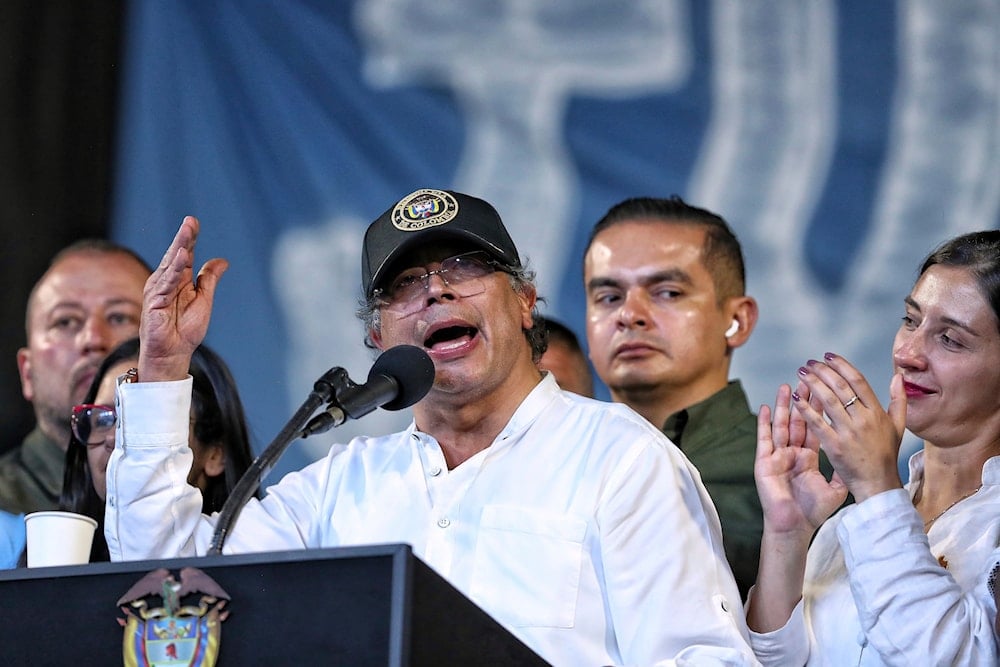Petro slams US-linked coup plot, signs decree for popular consultation
The Colombian president denounces a far-right coup plot backed by the US and launches a Popular Consultation to advance labor and social reforms.
-

Colombia's President Gustavo Petro speaks at a rally to garner support for a referendum on labor reform, in Cali, Colombia, on June 11, 2025. (AP)
Colombian President Gustavo Petro delivered a powerful address on Wednesday in Cali, Valle del Cauca, exposing a plot to overthrow his government. Petro accused far-right Colombian groups, backed by US Senator Marco Rubio and extremist elements, of orchestrating the conspiracy with the aim of reversing the social progress made under his administration.
“I have shared recordings with the Attorney General exposing far-right leaders linked to drug trafficking and plotting a coup,” Petro announced, urging US media to publish the evidence and reveal the extent of foreign interference undermining Colombia’s sovereignty.
Read next: Colombia presidential candidate shot in Bogota campaign attack
Calling on Colombians to reject fascism, Petro emphasized that entrenched inequality, not the Popular Consultation, is what fuels violence. “The consultation is not a friend of the assassins; social inequality is the friend of the assassins,” he said, linking social disparity directly to instability and unrest.
Popular consultation: Direct Democratic response to inequality
President Petro reaffirmed the urgent need for a Popular Consultation on labor and social reforms, citing ongoing legislative obstruction of the constitutional mandate to create a comprehensive labor statute.
"Since 1991, the Constitution has ordered the creation of a labor statute that still does not exist in law," he reminded, arguing that fulfilling this obligation is essential to building a just society under the rule of law.
"The peace of Colombia cannot be separated from social justice," he asserted, highlighting that Colombia remains the third most unequal country in the world. He reiterated that his administration was elected to achieve peace through equity and that such peace remains impossible without addressing systemic inequality.
The Popular Consultation would enable citizens to directly decide on crucial reforms, including an eight-hour workday ending at 6 pm, dignified wages and pensions for all workers, and protections for young and informal laborers.
Petro signs decree amid Congressional resistance
In a decisive move to break the legislative deadlock, Petro signed a decree calling for a Popular Consultation on labor reform. The announcement was made via his official account on platform X.
The decree has been submitted to Colombia’s Constitutional Court for review.
Petro clarified that the decree will be repealed if Congress enacts the proposed reforms before the elections, signaling his administration’s openness to legislative dialogue while preserving the people's right to decide.
Interior Minister Armando Benedetti reiterated that if the Senate passes the labor reform, the government will withdraw the decree, but maintained the importance of citizen participation as a safeguard for democratic decision-making.
Petro’s initiative comes amid intense political tensions and fierce opposition from conservative sectors and economic elites. He continues to push forward reforms aimed at reducing inequality and expanding labor protections, using the constitutional mechanism of popular consultation to overcome institutional blockades.
Grassroots mobilization for peace with social justice
In response to the decree, social and grassroots organizations across Colombia have announced plans for national mobilization in support of the Popular Consultation. These movements view the consultation as a tool to defend peace, dignity, and the constitutional rights of the working class.
Petro’s dual message, exposing a foreign-backed coup attempt and initiating a Popular Consultation, places Colombia at a critical juncture. The proposed reforms are not only a test of democratic resilience but a step toward reshaping the nation’s future through direct citizen engagement.
As Colombia moves closer to the referendum, the Popular Consultation stands as a vital mechanism for achieving the social justice necessary for lasting peace and national stability.
Maduro denounces US plan to overthrow Petro’s government
On a related note, Venezuelan President Nicolas Maduro has issued a firm denunciation of what he described as a US-backed destabilization plan targeting Colombia’s progressive government, led by President Gustavo Petro.
Speaking during a public event in Maracaibo, Zulia, on Monday, Maduro identified Rubio as a central figure behind efforts to undermine Petro’s administration and promote the return of far-right policies in the region.
“This is a clear attack on the sovereignty and democratic will of the Colombian people,” Maduro declared, warning that such external interventions threaten not only Colombia but also the broader stability of Latin America. He called for vigilance and unity among progressive forces across the region to resist what he termed “imperialist aggression".
Fortifying defense of Zulia necessary
In response to the rising tensions, Maduro underscored the necessity of fortifying the defense of Zulia, a vital border state shared with Colombia. He called for a robust alliance between civilian, military, and police sectors to maintain security and resist the influence of irregular armed groups allegedly supported by foreign actors.
He reiterated his proposal to establish a Binational Economic Zone between Venezuela and Colombia, centered in Zulia. The initiative, previously communicated to President Petro, aims to foster cross-border cooperation, economic integration, and social development.
According to Maduro, the creation of such a zone would serve as a direct countermeasure to divisive tactics employed by external powers, strengthening bilateral ties and promoting stability in the region.

 5 Min Read
5 Min Read








